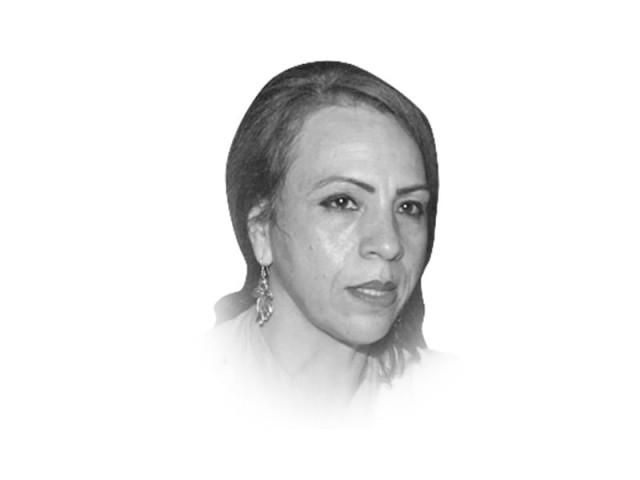A fractured consensus
Govt must establish its writ by registering madrassas without fear of backlash, ban all militant, sectarian outfits

The writer is a human rights activist and director of Gender Studies Centre. She tweets @drfarzanabari
After the decades-old mantra of the religious conservative parties that the Taliban are not terrorists, they have now started a new mantra, which basically states that madrassas are not involved in terrorism. There is no denying that all madrassas are not involved in supporting terrorism. However, the fact is that the majority of terrorist leaders, such as Baitullah Mehsud, Hakimullah Mehsud, Hafiz Gul Bahadur, Waliur Rehman Mehsud, Mullah Fazlullah and Khalid Haqqani are the products of different madrassas. The leadership of religious parties is, in effect, trying to protect the infrastructure and nurseries of terrorism.
The National Action Plan (NAP) identifies the regularisation of madrassas as one of the key steps in the fight against terrorism. However, the political leadership of religious parties has vehemently denounced the targeting of madrassas in the NAP. Maulana Fazlur Rahman says that madrassa students have never been involved in any terrorist activity. He conveniently forgets the role of madrassas in creating the jihadist mindset and serving as training camps for militants to fight the ‘Soviet infidels’ in Afghanistan on behalf of the US. The US used religious sensibilities to achieve its own imperialist interests in the region. The University of Nebraska, Omaha received funding support of $51 million to develop and design textbooks and jihad material. Over 13 million textbooks were printed and distributed in Afghan refugee camps and madrassas in Pakistan.
There is no reliable national level data on the number of madrassas currently operating in Pakistan. Five wafaqs associated with different sects are responsible for register them. According to Maulana Fazlur Rahman, there are more than 26,000 registered seminaries across the country, of which 22,000 have applied for registration, while only 241 seminaries are unregistered. The custodians of the wafaqs have never reported a single case against any registered or unregistered madrassa involved in organised violence and supporting terrorist activities. Now when the government is planning to register and regulate religious seminaries as part of the NAP to destroy the infrastructure of terrorism, they are raising a hue and cry.
It is understandable that religio-political parties will fight tooth and nail to keep madrassas under their exclusive control as it is a matter of their economic survival. According to an estimate, there are three million students studying in registered madrassas. The rough cost of just feeding them at the rate of Rs100 per day comes to Rs1.5 billion per annum. Who is providing this massive funding? Neither the government nor the public know their funding sources. There is no audit of these funds. According to the Madaris Regulation and Control Act, all madrassas are required to be registered with the government and make regular financial declarations. However, all wafaqs, united under the banner of the Ittehad Tanzimat Madaris Dinyia, resist the implementation of the law. Out of all the madrassas in Pakistan, the JUI-F and the JUI-S run 65 per cent of them. This helps explain the fierce resistance of Fazlur Rahman and Samiul Haq to madrassa reforms. Their economic interests lie in running the profitable industry of madrassas without any check and balance.
In 1947, there were only 137 madrassas in the country. Their exponential growth took place during the 1980s and the number currently stands at around 50,000. This is clearly a result of governance failure and the state’s inability to provide basic education to all its citizens. Madrassas have moved in to fill the gap that the national education system has failed to fill. Now to dismantle the extremist mindset, formal and informal educational institutions, including seminaries, have to play a central role as they did in creating it. Therefore, it is imperative that the government nationalise all madrassas and revamp the curriculum taught in public and private educational institutions to eliminate the ideological and institutional basis of terrorism. Also, as madrassas are affiliated with different sects, they are actively fostering hatred of members of other religions and of Muslims of different sects. Their teaching contributes to the creation of the sectarian mindset. Sectarian violence is on the rise across the country. According to a research report by the Institute of Conflict Management, between 1989 and 2015, there were 2,963 incidents of sectarian violence in which 4,932 people were killed and 9,536 were injured. The Shia community, in particular, is a target of this sectarian violence. More than 200,000 Hazaras living in Quetta have been forced to move to other cities or abroad.
The registration of madrassas and bringing them under the direct control of government institutions is a litmus test for the state’s resolve to fight terrorism. Religious parties are using the Charlie Hebdo issue to flex their muscles and show their street power. The government must not be blackmailed by this. It should establish its writ by registering madrassas without fear of any backlash, banning all militant and sectarian outfits and immediately arresting their leadership. This will not only show the government’s seriousness, but will also instill in the public faith in the government’s resolve to fight terrorism.
Published in The Express Tribune, February 3rd, 2015.
Like Opinion & Editorial on Facebook, follow @ETOpEd on Twitter to receive all updates on all our daily pieces.

















COMMENTS
Comments are moderated and generally will be posted if they are on-topic and not abusive.
For more information, please see our Comments FAQ